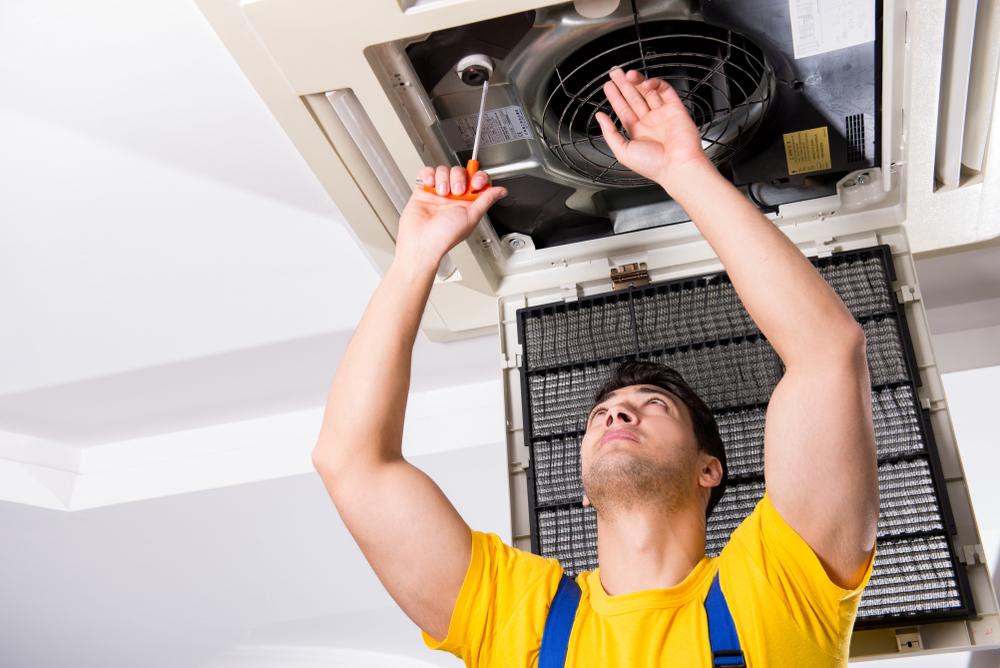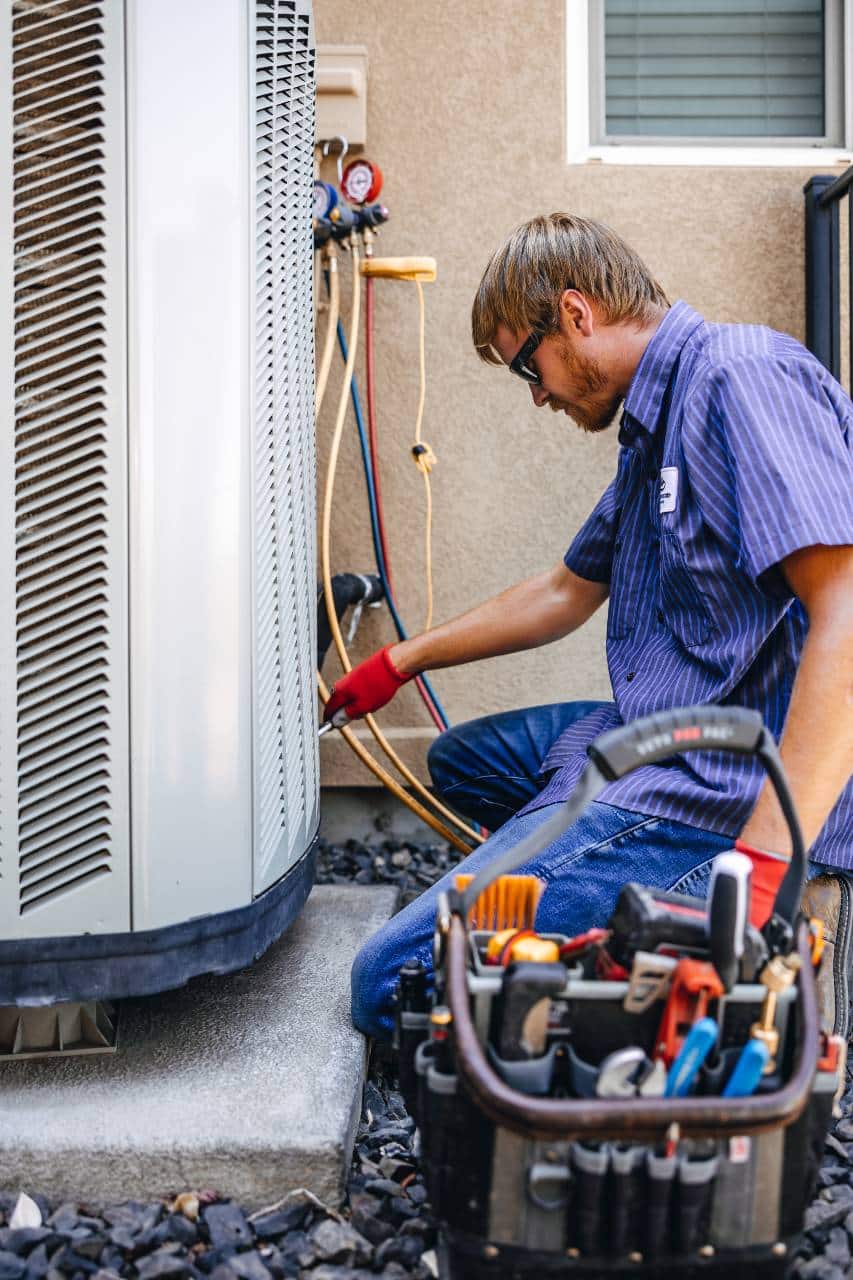Unlocking Prospective: The Duty of Heating And Cooling Workers in a Lasting Work Market
The heating and cooling market is undertaking considerable makeovers as sustainability becomes a concern. Cooling and heating workers go to the center of this modification, outfitted with the skills to execute eco-friendly innovations and effective systems. Their competence not only addresses present needs yet likewise places them as necessary gamers in the future of energy conservation. As the landscape progresses, comprehending their function will reveal exactly how they contribute to a greener economy and adjust to brand-new difficulties.
The Growing Value of Sustainability in heating and cooling
As the worldwide focus on environmental problems increases, the a/c market is progressively prioritizing sustainability. This shift shows a broader dedication to lowering carbon impacts and preserving power. A/c systems, typically known for their energy intake, are now being redesigned to optimize efficiency and decrease environmental influence. Market stakeholders are integrating sustainable techniques, such as utilizing eco-friendly refrigerants and enhancing system styles for lower energy use.
Regulatory structures are progressing to urge greener modern technologies, compelling Cooling and heating professionals to adjust to these adjustments. Educating programs are being developed to outfit workers with the necessary skills to apply lasting solutions. This growing emphasis on sustainability not only attract environmentally conscious consumers but additionally positions cooling and heating workers as essential gamers in the development towards a greener future. Consequently, the need for proficient professionals proficient in sustainable methods in cooling and heating is expected to rise, shaping a more resilient task market.
Cutting-edge Technologies Changing the Heating And Cooling Market
Cutting-edge technologies are reshaping the cooling and heating industry, driving effectiveness and boosting user convenience while addressing sustainability challenges. The integration of clever thermostats and IoT tools permits for real-time surveillance and control of cooling and heating systems, making it possible for individuals to optimize their energy consumption. Additionally, developments in variable refrigerant flow (VRF) systems provide effective and versatile home heating and cooling down solutions customized to specific structure demands.
Additionally, using innovative filtering innovations enhances indoor air quality, attending to health and wellness issues while promoting power effectiveness. Automation and anticipating upkeep powered by man-made intelligence and machine discovering boost functional performance, minimizing downtime and prolonging devices life-span.
The increase of eco-friendly energy resources, such as solar-powered Cooling and heating systems, straightens with worldwide sustainability objectives. Collectively, these cutting-edge technologies are not just changing functional methods however likewise redefining the role and skillset of a/c specialists in a quickly evolving market.
Power Performance: A Key Emphasis for Heating And Cooling Professionals
Power performance has arised as a key concern for cooling and heating professionals in light of energy-saving practices and recent advancements. These innovations not only enhance system performance but likewise noticeably decrease the carbon impact related to heating & cooling. HVAC Jobs Only job board. As the sector develops, the commitment to power performance will certainly play a vital duty in shaping sustainable heating and cooling options
Advancements in A/c Modern Technology
While the need for reliable environment control proceeds to climb, cooling and heating experts are significantly turning their interest to technologies that prioritize energy effectiveness. Advancements in technology are improving the industry, with clever thermostats and variable refrigerant flow systems acquiring traction. These developments enhance temperature guideline while minimizing energy usage. Additionally, the assimilation of Net of Things (IoT) tools makes it possible for real-time surveillance and anticipating maintenance, further enhancing system performance. Green cooling agents are likewise being created to lessen environmental influence. As power performance comes to be an important emphasis, a/c workers are welcoming these technical innovations, guaranteeing that environment control options are sustainable and economical. Such developments not just benefit the setting yet additionally improve the total efficiency of HVAC systems.
Energy-Saving Practices Implemented
As the cooling and heating market advances, specialists are progressively adopting energy-saving techniques that substantially enhance efficiency. Technicians are currently concentrating on advanced analysis tools to evaluate system performance accurately. Normal maintenance timetables have actually ended up being typical, guaranteeing ideal operation and preventing energy waste. Professionals are also recommending high-efficiency equipment, which makes use of sophisticated technologies to reduced energy usage substantially. On top of that, the integration of wise thermostats permits tailored environment control, adjusting to individual choices while minimizing excess energy use. Insulation enhancements and air duct sealing are additionally highlighted, optimizing the effectiveness of cooling and heating systems. Collectively, these techniques not only enhance operational efficiency but also add to long-lasting expense savings for consumers, reinforcing the necessary role of a/c professionals in promoting lasting energy solutions.
Influence On Carbon Footprint
The implementation of energy-saving practices in the cooling and heating market significantly influences the carbon footprint related to heating and cooling systems. By prioritizing power effectiveness, heating and cooling professionals contribute considerably to decreasing greenhouse gas discharges. High-efficiency tools, such as energy-efficient central heating boilers and air conditioners, minimizes power consumption while preserving optimal interior climates. In addition, routine maintenance and system upgrades ensure peak operational performance, further decreasing energy usage (HVAC Jobs Only website). Advanced technologies, including wise thermostats and variable speed drives, permit accurate control over power consumption, causing significant reductions in carbon exhausts. Jointly, these methods not only boost sustainability yet additionally placement HVAC employees as vital gamers in the change toward a greener economic situation, ultimately promoting a much more lasting future for the market and the setting
The Function of Cooling And Heating Employees in Reducing Carbon Footprint
A/c employees play a vital duty in reducing the carbon impact with energy performance enhancements and the integration of eco-friendly power sources. By optimizing air, ventilation, and home heating conditioning systems, they add to lower power consumption and greenhouse gas discharges. Their expertise not only boosts structure efficiency but also sustains more comprehensive sustainability objectives.
Energy Effectiveness Improvements
While lots of markets are functioning to improve sustainability, website link cooling and heating employees play an important function in implementing power performance renovations that greatly decrease carbon footprints. These specialists are necessary in optimizing systems to reduce energy consumption and improve performance. With routine maintenance, they assure that HVAC systems operate at peak efficiency, reducing unnecessary energy use. Furthermore, they are knowledgeable in recognizing out-of-date devices and recommending energy-efficient choices, such as high-efficiency boilers and clever thermostats. Their competence also includes educating customers concerning news proper system usage and seasonal modifications, further promoting sustainable methods. By using innovative modern technologies and best methods, a/c employees add substantially to decreasing greenhouse gas discharges, making them essential gamers in the change towards a greener future.
Renewable Resource Assimilation
As renewable power sources obtain traction in the pursuit for sustainability, heating and cooling employees are increasingly tasked with integrating these innovations right into existing systems. This combination includes the adoption of solar panels, geothermal systems, and energy-efficient heatpump, which significantly lower reliance on nonrenewable fuel sources. By retrofitting buildings with these eco-friendly services, cooling and heating professionals play a vital duty in decreasing carbon impacts and boosting energy performance. Their competence is basic in guaranteeing that these systems run sympathetically within conventional cooling and heating frameworks. Furthermore, HVAC employees are crucial in informing customers concerning the advantages of renewable resource, fostering a shift toward a lot more lasting techniques. HVAC Jobs Only jobs. Ultimately, their contributions are essential ahead of time the sector's dedication to ecological stewardship and energy preservation
Training and Skills Advancement for Sustainable Practices
To flourish in a swiftly progressing task market, workers have to focus on training and abilities growth concentrated on lasting practices. The cooling and heating sector is increasingly integrating eco-friendly innovations, necessitating that service technicians get expertises in energy-efficient systems and environmentally friendly refrigerants. Ongoing education programs are important for workers to stay upgraded on arising trends, such as smart building modern technologies and progressed climate control services.
Hands-on training and certification in sustainable techniques not only enhance private know-how however likewise add to total sector standards. Partnership with universities and industry companies can cultivate a labor force that is proficient in sustainable a/c options. Additionally, accepting electronic devices and software for power monitoring can additionally empower workers to apply effective systems. As the demand for sustainable practices expands, HVAC experts furnished with specialized training will be much better positioned to satisfy customer expectations and governing requirements, ultimately enhancing their worth in the work market.
Career Opportunities in the Evolving Heating And Cooling Landscape
The developing heating and cooling landscape presents a wealth of career possibilities for specialists outfitted with lasting methods and cutting-edge abilities. As the need for energy-efficient systems increases, there is an enhancing requirement for specialists that are well-informed in green innovations and eco friendly options. Placements in design, installation, and upkeep of sophisticated cooling and heating systems are becoming extra common, as companies seek to enhance efficiency and lower carbon impacts.

The Future of Heating And Cooling: Fads and Forecasts for Sustainability
While the HVAC market remains to evolve, trends suggest a solid change towards sustainability as a basic element of future developments. Developments in energy-efficient systems, such as variable cooling agent circulation and clever thermostats, are becoming progressively common. These modern technologies not just decrease energy consumption however likewise improve customer convenience by maximizing environment control.
The integration of renewable resource resources, such as solar and geothermal systems, is also obtaining traction. This change lines up with global initiatives to reduce carbon impacts and combat climate change. Additionally, developments in green cooling agents aim to reduce ecological influence while preserving system effectiveness.
As laws tighten up around power performance and emissions, HVAC employees will need to adjust to new criteria and technologies. Continual education and learning and training will be essential for specialists to prosper in this developing landscape, ensuring they continue to be important to the sustainability motion within the sector.
Frequently Asked Inquiries
What Accreditations Are Readily Available for Cooling And Heating Professionals Concentrated On Sustainability?
HVAC specialists can go after accreditations such as LEED Green Affiliate, EPA Section 608 Accreditation, and NABCEP Solar PV Installer. These qualifications improve their competence in lasting techniques, energy performance, and eco-friendly innovations within the sector.
Exactly How Can HVAC Workers Supporter for Greener Practices Within Their Business?
A/c workers can support for greener practices by presenting research study on sustainable technologies, recommending energy-efficient services, taking part in training sessions, and teaming up with monitoring to establish green plans that profit both the company and the atmosphere.
What Are the Common Misconceptions About Heating And Cooling Careers in Sustainability?
Typical mistaken beliefs concerning HVAC professions in sustainability include the belief that these functions are only technical, lack growth chances, or do not significantly influence ecological initiatives, weakening their essential duty in promoting power efficiency and environment-friendly techniques.

How Does Climate Adjustment Affect HVAC Job Safety and Demand?
Climate adjustment enhances need for energy-efficient a/c systems, enhancing work safety and security for a/c experts. As policies tighten and recognition expands, proficient workers are essential for implementing lasting options, making sure a robust future in the sector.

What Are the most effective Resources for Postgraduate Work in Sustainable A/c Practices?
The best sources for proceeding education in sustainable cooling and heating practices include on-line programs from recognized institutions, industry webinars, trade organizations, and certification programs concentrated on energy effectiveness, eco-friendly innovations, and sustainable design concepts.
HVAC systems, typically understood for their power consumption, are currently being upgraded to make the most of efficiency and reduce ecological influence. Heating and cooling employees play an essential role in decreasing the carbon footprint with energy effectiveness renovations and the assimilation of sustainable energy resources. With normal upkeep, they guarantee that A/c systems run at peak effectiveness, minimizing unnecessary energy use. As renewable energy sources obtain grip in the pursuit for sustainability, A/c employees are significantly tasked with incorporating these modern technologies right into existing systems. Environment adjustment enhances demand for energy-efficient Cooling and heating systems, improving task safety and security for HVAC specialists.